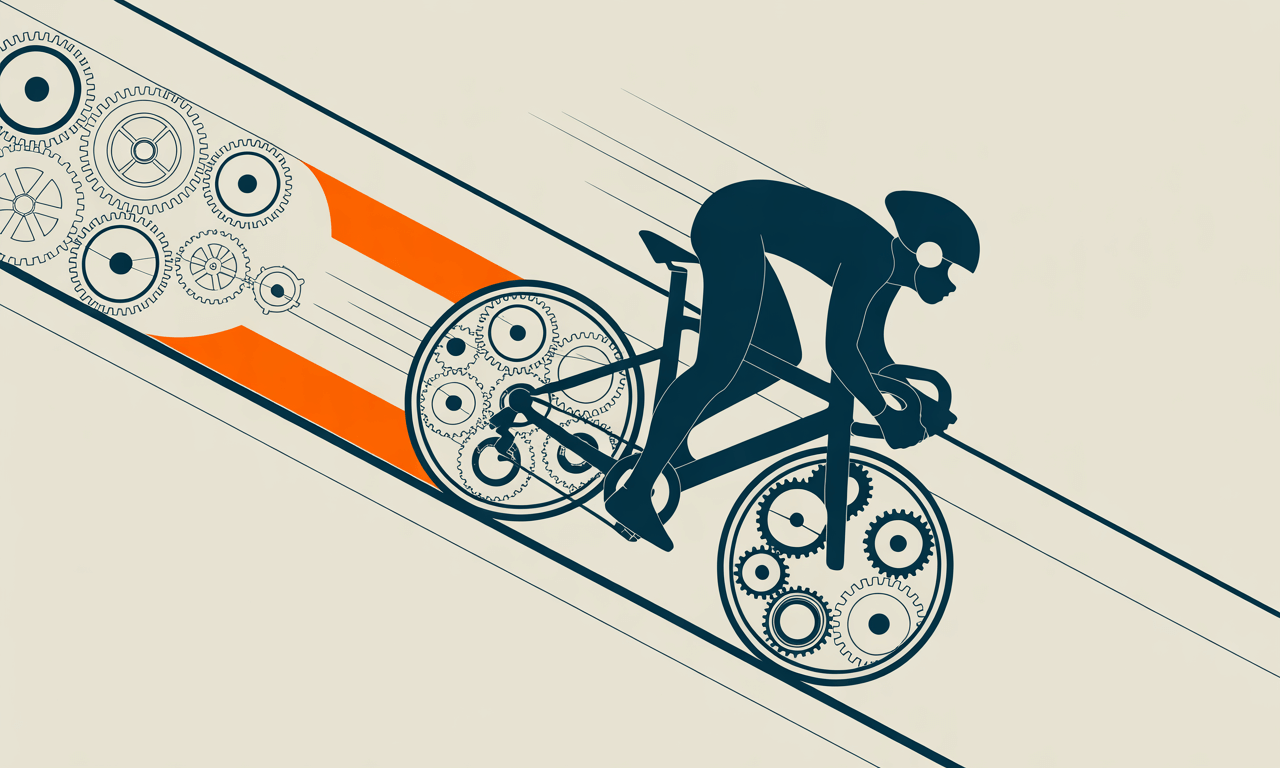In 2003, British cycling was a joke.
In 110 years, no British cyclist had ever won the Tour de France. Performance was so bad that a top European bike manufacturer refused to sell bikes to the team, fearing it would hurt their brand.
When Dave Brailsford took over as performance director, he had a crazy idea: forget the goal. Focus on systems.
Instead of obsessing over winning the Tour de France, Brailsford implemented what he called “the aggregation of marginal gains” — improving everything by just 1%.
They redesigned bike seats for better comfort. They tested massage gels to find which one aided recovery fastest. They taught riders proper handwashing to avoid colds. They painted the inside of team trucks white to spot dust that could affect bike maintenance. They brought custom pillows to hotels so riders could sleep better.
Every tiny detail. Every small system. Every 1% improvement.
Three years later — not five — they won the Tour de France.
From 2007 to 2017, British cyclists won 178 world championships, 66 Olympic gold medals, and 5 Tour de France victories. Widely regarded as the most successful run in cycling history
They didn’t achieve this by setting bigger goals. Every cycling team wanted to win the Tour de France.
They achieved it by building better systems.
As I’m writing this now it’s mid-November 2025. In roughly six weeks, you’ll set another New Year’s resolution. And by February, you’ll quit.
Again. (Because roughly 92% of them fail.)
Not because you’re lazy. Not because you lack discipline.
But because goals are procrastination disguised as planning.
Why Goals Create Pre-Success Failure (And What to Do Instead)
Here’s the thing about goals: they feel productive.
You sit down in January. You write down what you want to achieve. Lose 20 pounds. Get promoted. Launch a side business. Write a book.
You feel motivated. Energized. Ready.
BUT here’s what actually happens.
You wake up every single day in what James Clear calls “a state of pre-success failure.” You haven’t hit your goal yet, so technically, you’re failing. Every single day you’re not 20 pounds lighter, you’re reminded that you haven’t succeeded yet.
Goals create an all-or-nothing mindset. Miss one workout? The whole resolution feels destroyed. Have one bad week at work? Your promotion suddenly feels impossible.
Even worse — goals put blinders on.
Scott Adams, creator of Dilbert, learned this the hard way. Before Dilbert became one of the most successful comic strips in history, Adams had nearly 10 years of failed ventures. Two restaurants. A food company. Multiple software products. All failures.
His former banking boss taught him something crucial: never lend money to passionate people because “passion clouds judgment.”
Goals do the same thing. They make you so focused on one outcome that you miss better opportunities right in front of you.
Adams didn’t create Dilbert as his dream goal. It was just another experiment in a broader system—testing “things that probably wouldn’t work, but if they did, had untapped potential to get very large.”
THE RESOLUTION REALITY CHECK
Every January, millions of professionals set ambitious goals. By February, most have quit.
Research from the University of Scranton shows that 75% of people keep their resolutions after one week. By the second week of February, 80-90% have failed. Only 8-10% achieve their goals by year-end.
The problem isn’t willpower. It’s that goals assume a future you can’t control, while systems focus on inputs you can control today.
Why Having the Same Goals as Winners Doesn’t Make You One
Every Olympic athlete wants to win gold.
Every entrepreneur wants to build a million-dollar business.
Every writer wants to publish a bestseller.
So why do some succeed and others don’t?
James Clear discovered something counterintuitive: “My results had very little to do with the goals I set and nearly everything to do with the systems I followed.”
Think about it like a messy room.
You can set a goal to have a clean room. You can even summon the energy to tidy up. And you’ll have a clean room—for now.
BUT if you maintain the same sloppy habits that led to the mess in the first place, you’ll soon be looking at a new pile of clutter.
You fixed the outcome. You didn’t fix the system.
Goals are about the results you want. Systems are about the processes that lead to those results.
The British cycling team didn’t need a bigger goal. They needed better systems.
How Maya Angelou and Stephen King Built Writing Systems (Not Goals)
Maya Angelou knew she couldn’t write at home.
Not because she traveled. Not because she lacked space. But because, as she put it: “I try to keep home very pretty, and I can’t work in a pretty surrounding. It throws me.”
So she rented anonymous hotel rooms. Cheap ones. “Tiny, mean room with just a bed, and sometimes, if I can find it, a face basin.”
Every morning, she’d wake at 5:30 AM. Leave home by 6 AM. Arrive at the hotel by 7 AM. Write for seven straight hours until 2 PM.
She’d write 10-12 pages daily, then go home and edit them down to 3-4 pages.
Sometimes the intensity of the work brought on strange physical reactions—her back went out, her knees swelled, her eyelids once swelled completely shut.
BUT she showed up to that hotel room. Every single day.
The result? I Know Why the Caged Bird Sings held the record for longest-running nonfiction New York Times bestseller—two years. Time Magazine named it one of the 100 best books written in English since 1923.
Angelou didn’t have a goal to write a record-breaking bestseller. She had a system: rent the hotel room, show up at 7 AM, write for seven hours.

Stephen King operates the same way.
Two thousand words. Every single day. No exceptions.
Not on weekends. Not on holidays. Not on Christmas.
Why? Because King discovered that if he doesn’t write every day, “the characters begin to stale off in my mind—they begin to seem like characters instead of real people. The tale’s narrative cutting edge starts to rust and I begin to lose my hold on the story’s plot and pace.”
He starts at 8 AM. Writes until noon. Gets his 2,000 words (roughly 10 pages). Done.
“That’s 180,000 words over a three-month span, a goodish length for a book.”
The results? King has published 60+ novels, 200+ short stories, and sold over 350 million copies. He finishes a book every three months.
King doesn’t set a goal to “write a bestseller.” He has a system: 2,000 words daily, no matter what. The bestsellers are the output.

THE SCOREBOARD PRINCIPLE
Bill Walsh, legendary NFL coach who won three Super Bowls, wrote a book called The Score Takes Care of Itself.
His philosophy? “You want to have the best score on the scoreboard at the end of the game, but it would be ridiculous to spend all game looking at the scoreboard.”
Players who obsessed over the score created anxiety and made mistakes.
Walsh focused on the system: how they recruited, how they practiced, how they recovered. The wins were the output.
5 System Shifts That Replace Goals (And Actually Work)
You don’t need better goals. You need better systems.
Here’s how to make the shift:
System Shift #1: Focus on Identity, Not Outcomes
Stop asking: “What do I want to achieve?”
Start asking: “What do I want to become?”
Goals focus on results. Systems focus on identity.
When Maya Angelou rented hotel rooms, she wasn’t trying to hit a word count goal. She was becoming the kind of writer who shows up every day, regardless of inspiration.
When the British cycling team painted trucks white to spot dust, they weren’t checking a box. They were becoming the kind of organization that obsesses over tiny details.
Do this in 5 minutes: Pick one goal you currently have. Reframe it as an identity. Instead of “I want to lose 20 pounds,” say “I want to become the kind of person who never misses a workout.” The action becomes about who you are, not what you’re chasing.
System Shift #2: The Aggregation of Marginal Gains (1% Rule)
Dave Brailsford didn’t try to revolutionize cycling overnight. He improved everything by 1%.
Better bike seats. Better massage gels. Better handwashing. Better sleep.
Tiny improvements. Compounding results.
James Clear calls this “the aggregation of marginal gains.” You don’t rise to the level of your goals. You fall to the level of your systems.
Most people overestimate what they can do in a day and underestimate what they can do in a year with consistent 1% improvements.
Do this in 5 minutes: Write down five things you do regularly related to your goal. Pick three where you can make a 1% improvement this week. Not 50%. Just 1%. A better morning routine. A cleaner workspace. A 10-minute learning block.
System Shift #3: Design Systems You Can’t Fail (The Seinfeld Strategy)
Stephen King’s system works because it’s simple: 2,000 words. Every day. No matter what.
Jerry Seinfeld is known for using the same principle. He shared this tip with an upcoming comedian. He told him to write better jokes you had to write every day. He told him to get a big wall calendar and mark an X each day that he wrote. His job was to just write and make his X. Do it long enough and he would have a chain. He had one job.
Don’t break the chain.
Consistency beats intensity.
You don’t need four-hour work sessions. You need systems so simple that NOT doing them feels harder than doing them.
I know this one intimately. I love to write. For years I’ve set daily writing goals. Failed every time. Too busy. Too tired. Too overwhelmed. Excuses, excuses, excuses.
A few months go I set blocks to write. But I slipped them in between meetings at times that I’m at my desk. Now you’re finally reading my work.
Do this in 5 minutes: Pick ONE daily action. Not five. One. Make it so small that you’d feel stupid NOT doing it. Two minutes of writing. One pushup. Five minutes of learning. Then, get a calendar and mark an X every day you do it. Don’t break the chain.
System Shift #4: How to Course-Correct Without Breaking Your System
Goals assume a straight line to success. Systems assume you’ll get off track—and build in ways to course-correct.
Maya Angelou’s body literally rebelled against her writing system. Her back went out. Her knees swelled. Her eyelids swelled shut.
BUT the system didn’t depend on her feeling good. It depended on showing up to the hotel room. Some days she wrote. Some days she stared at the wall. The system kept running.
James Clear’s principle: “The purpose of setting goals is to win the game. The purpose of building systems is to continue playing the game.”
Do this in 5 minutes: Identify the biggest obstacle to your system. What happens when you’re busy? Sick? Traveling? Build a “minimum viable version” of your system for bad days. If you can’t write 2,000 words, write 200. If you can’t work out for an hour, do 10 minutes. The system adapts. It doesn’t break.
System Shift #5: Track What You Control (Inputs Over Outcomes)
Bill Walsh didn’t measure success by the scoreboard during the game. He measured preparation, execution, and process.
Goals make you measure outcomes you can’t fully control. Systems make you measure inputs you can.
You can’t control whether you get promoted. You can control showing up with solutions, not problems.
You can’t control whether your book becomes a bestseller. You can control writing 2,000 words daily.
You can’t control winning the Tour de France. You can control improving 100 tiny details by 1%.
Do this in 5 minutes: Stop tracking outcomes for one week. Track inputs instead. Don’t measure pounds lost—measure workouts completed. Don’t measure revenue—measure sales calls made. Don’t measure followers gained—measure posts published. Inputs are controllable. Outcomes are byproducts.
The Truth About Goals (That No One Wants to Hear)
Here’s what I’ve learned after years of setting goals and watching them fail:
Goals feel productive, but they’re often procrastination in disguise.
You write them down. You feel like you’ve done something. You haven’t.
Systems feel boring. Repetitive. Unglamorous.
Show up to a hotel room for seven hours. Write 2,000 words every single day. Improve 100 tiny things by 1%.
There’s no motivational high. No big moment. No viral launch.
Just consistent, compounding progress.
BUT that’s exactly why systems work.
Dave Brailsford didn’t win by wanting it more than other cycling teams. He won by improving 100 tiny things by 1%.
Maya Angelou didn’t write bestsellers by setting writing goals. She rented hotel rooms and showed up for seven hours. Every day.
Stephen King doesn’t publish books by chasing outcomes. He writes 2,000 words. Every single day.
You don’t need a bigger goal. You need a better system.
Pick one thing. Make it small. Make it daily. Make it impossible NOT to do.
Then show up.
The wins will come.
Research shows 92% of resolutions fail by February because goals create a “pre-success failure” state—you’re technically failing every day until you achieve the goal. Systems focus on daily processes you can control, making success automatic rather than aspirational.
Goals are about the results you want to achieve (lose 20 pounds, win Tour de France). Systems are about the processes that lead to those results (daily workouts, 1% improvements in 100 areas). Winners and losers have the same goals; winners have better systems.
Performance director Dave Brailsford implemented “the aggregation of marginal gains”—improving everything by just 1%. They redesigned bike seats, tested massage gels, taught proper handwashing, and optimized 100+ tiny details. The compound effect led to 5 Tour de France victories and 178 world championships.
Goals create anxiety and all-or-nothing thinking, while systems create consistent progress through identity-based habits. The most successful people—from British cyclists to Stephen King—focus on daily processes (writing 2,000 words, improving 100 things by 1%) rather than distant outcomes. You don’t rise to your goals; you fall to the level of your systems.





